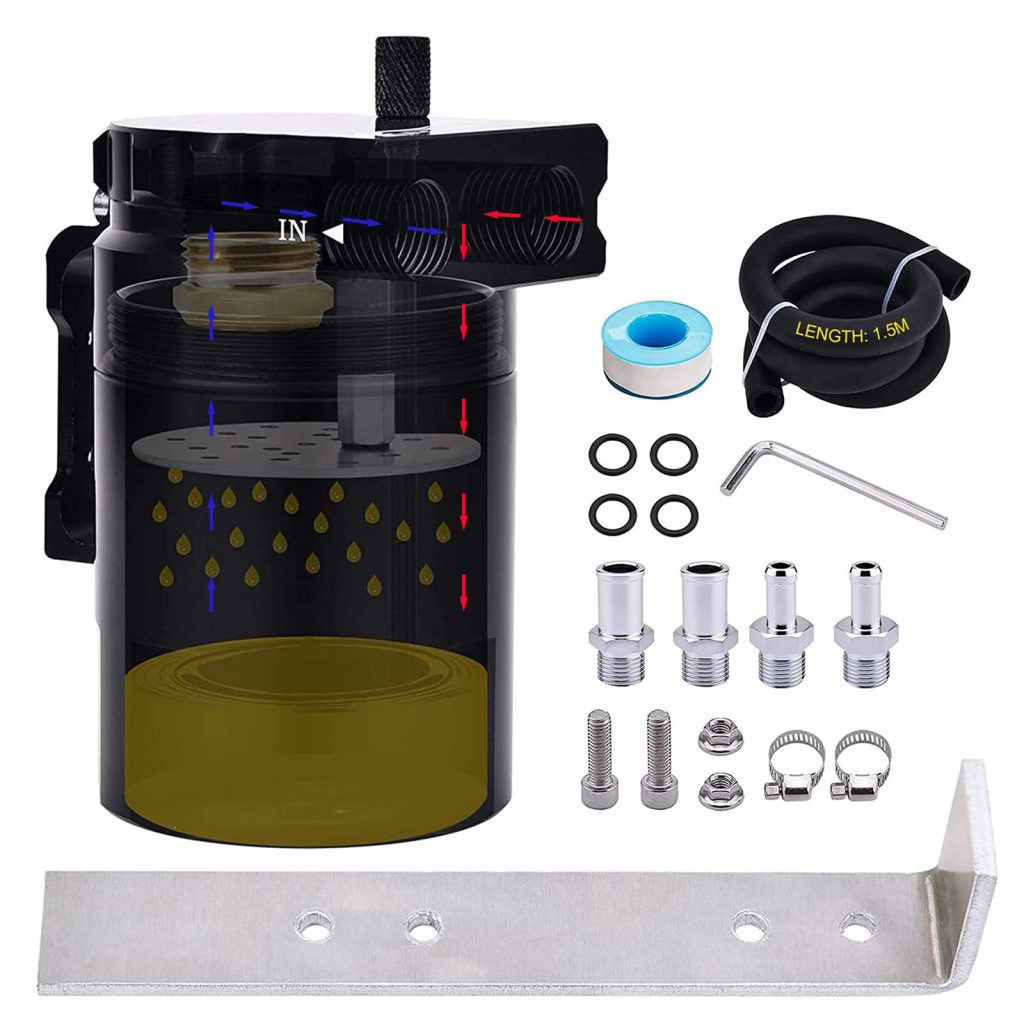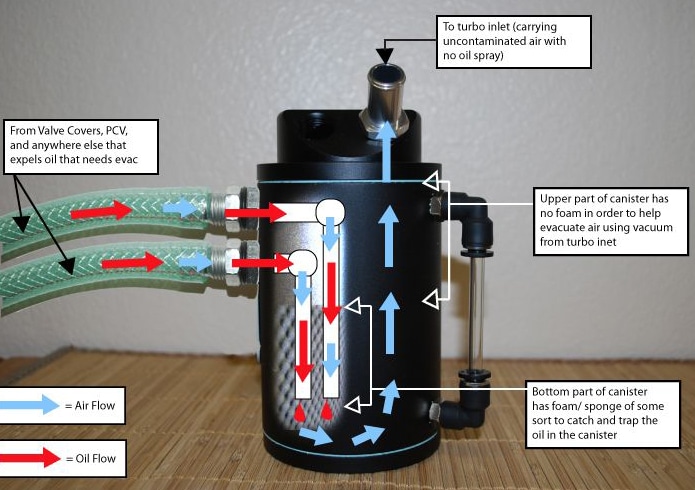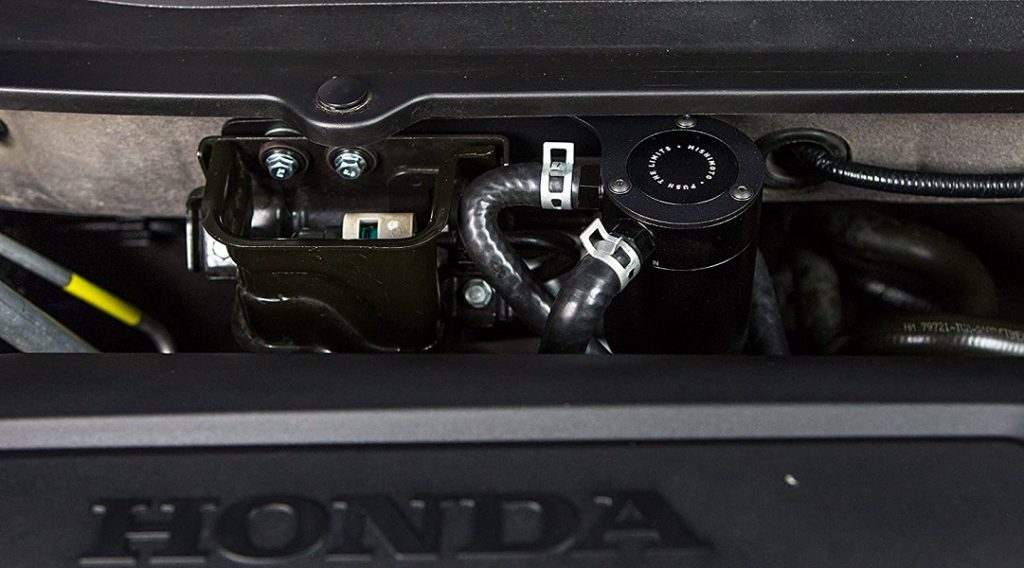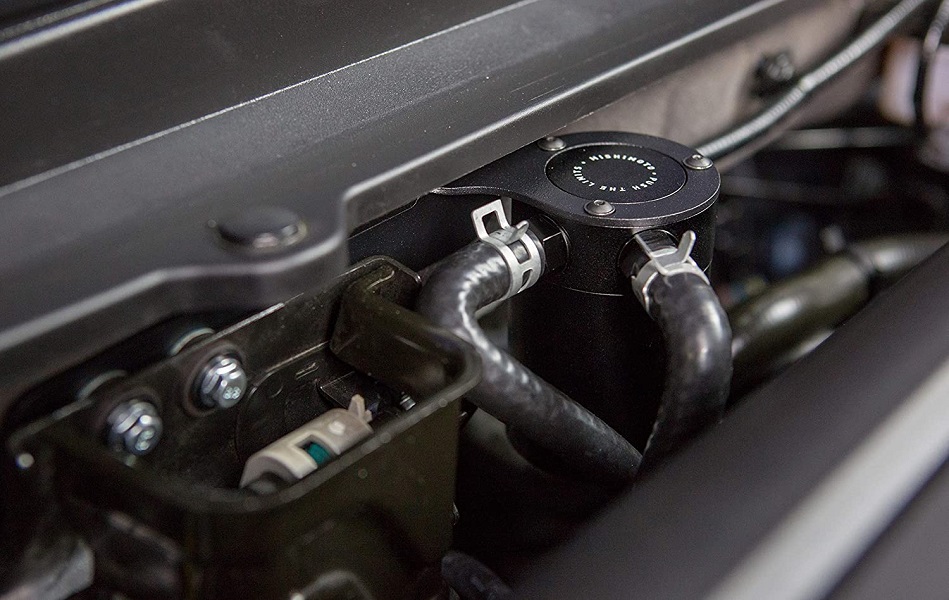Yes, oil catch cans are worth it as they can prolong the life of your engine and prevent future maintenance costs. Oil catch cans are aftermarket devices designed to capture oil vapors and prevent them from recirculating back into your engine’s air intake system.
This can help reduce carbon buildup on the engine’s internals and intake valves, which can impede performance over time. While not necessary for all vehicles, oil catch cans can be particularly useful for turbocharged or performance-oriented engines that generate more blow-by gases.
Additionally, they can prevent oil vapor from coating your intercooler, reducing its efficiency and potentially hindering performance. Overall, investing in an oil catch can can help prolong the life of your engine and save you money in the long run.

How Oil Catch Cans Work

Are oil catch cans worth it? If you’re someone who takes their car’s maintenance seriously, you may have heard of oil catch cans and their benefits. In this section, we’ll discuss the basics of how oil catch cans work, the benefits of using them and engines that benefit most from oil catch cans.
Don’t Forget to Read: Best Oil Catch Can for Ford F150 Ecoboost
Explain The Basics Of How Oil Catch Cans Function
An oil catch can is an external component added to a vehicle’s engine to prevent oil vapors from circulating within the engine’s air intake system. The basic purpose of an oil catch can is to filter out harmful bacteria, moisture, and oil residue that may accumulate in a vehicle’s engine.
Here’s how it works:
- As the engine runs, it generates oil vapors that travel through the vehicle’s pcv (positive crankcase ventilation) system and back into the air intake system.
- The oil catch can intercepts the oil vapors and filters out contaminants and oil residue, separating them from the clean air traveling through the system.
- Once filtered, the clean air is released into the engine’s air intake system, and the collected residue can be emptied from the oil catch canister.
Detail The Benefits Of Using Them
The most significant benefit of using an oil catch can is that it protects the engine from oil contaminants that can accumulate within the engine’s air intake system and cause various issues. Here are some additional benefits of using oil catch cans:
- Increases engine efficiency by preventing oil vapors from circulating through the engine’s air intake system.
- Reduces the risk of engine deposits, reducing the chance of engine failure.
- Extends the life of the engine by reducing the amount of harmful contaminants circulating through it.
- Improves fuel economy by ensuring that clean, contaminant-free air is entering the engine.
Provide Examples Of Engines That Benefit Most From Oil Catch Cans
While all engines can benefit from using oil catch cans, some engines produce more oil vapors than others. Engines with a high output or forced induction are most likely to have issues with oil vapors circulating in their air intake system.
Here are some examples of engines that can significantly benefit from oil catch cans:
- Turbocharged and supercharged engines
- Direct injection engines
- Performance engines
- High mileage engines
Overall, oil catch cans are an excellent investment for anyone serious about maintaining their vehicle’s engine and ensuring it’s running efficiently. By intercepting harmful contaminants, oil catch cans not only extend the life of the engine but improve the vehicle’s overall performance.

Arguments In Favor Of Oil Catch Cans
Are Oil Catch Cans Worth It
If you’re an automobile enthusiast or just someone who wants to take good care of their car’s engine, you might have come across the term ‘oil catch can’. It’s a relatively new gadget in the market, but one that has been gaining popularity rapidly.
But are oil catch cans really worth buying? Let’s delve deeper into arguments in favor of oil catch cans.
Highlight The Potential Long-Term Savings
An oil catch can might seem like an unnecessary expense to some, but in reality, it can save you a lot of money in the long run. Here are some potential ways it could help you save:
- Prevents premature engine wear caused by oil deposits. Over time, oil accumulation in the engine can cause wear and tear of the engine components, which can cost a significant amount in repairs.
- Increases engine life-span. When the engine is free of oil buildup, it can work more efficiently and effectively, and its life span is prolonged.
- Lowers fuel costs. Reduced oil consumption means fewer trips to the gas station, increasing your miles per gallon ratio.
Discuss The Benefits For High-Performance Engines
High-performance engines are designed to generate more horsepower, but they also produce a lot of gases and oil mist. An oil catch can be a game-changer for such engines.
- Increases overall power output. A cleaner engine can produce more power. Since an oil catch can eliminate oil mist, it helps in increasing the engine’s performance.
- Prevents oil from entering the combustion chamber. When the oil enters the combustion chamber, it reduces the quality of the fuel and can cause power loss. An oil catch can prevent this from happening.
- Prevents detonation. Detonation, also known as engine knock, can cause damage to the engine, especially in high-performance engines, which generally run at higher rpm. The oil catch can works to prevent engine knock from happening.
Highlight The Reduction In Carbon Buildup
Carbon buildup is one of the most significant problems faced by car owners. It can cause a multitude of issues, including poor performance, reduced fuel efficiency, and can lead to expensive repair bills. Here’s how an oil catch can combat carbon buildup.
- Reduces harmful emissions. A cleaner engine with less carbon buildup means fewer harmful gases emitting into the environment.
- Increases fuel efficiency. When there is no carbon deposit in the engine, it works more efficiently, allowing for better fuel economy.
- Lowers maintenance costs. Fewer carbon deposits in the engine mean fewer repair costs and reduced maintenance needs.
Oil catch cans may seem like an added expense, but in reality, they offer more benefits than one can imagine. From decreasing the long-term cost of repairs to enhancing the overall performance of the engine, an oil catch can be the right addition to any car owner’s wish list.
Arguments Against Oil Catch Cans
Are oil catch cans worth it: arguments against oil catch cans
Engineers and car enthusiasts alike have debated whether or not oil catch cans are worth the investment. In this subheading, we will explore some of the most common arguments against oil catch cans and evaluate their validity.
Explain Why Some Believe They May Not Be Worth It
- The cost of oil catch cans can be a major turn-off for some car owners. They may not see the value in making this investment, especially if they have not experienced any problems with oil buildup in their engines.
- Some people may believe that oil catch cans are a gimmick and do not actually solve any problems. They may feel that the oil that is caught in the can will eventually make its way back into the engine and cause issues down the line.
- Others may not see the point in installing an oil catch can if they have a newer car model that already has advanced engine technology and built-in systems to manage oil buildup.
Discuss The Potential For Decreased Engine Horsepower
- One of the arguments against oil catch cans is that they can reduce engine horsepower. This is because the catch can restricts airflow and can cause the engine to work harder to compensate.
- However, this potential issue can be mitigated by choosing a high-quality catch can that has been specifically designed not to impede airflow.
Detail Any Potential Installation Difficulties
- The installation process for oil catch cans can be tricky, especially for car owners who do not have much experience working with engines. Some catch cans may require modifications to the car’s existing systems, which can be difficult and time-consuming.
- Additionally, there may be compatibility issues if the catch can is not designed for a specific make and model of car. This can cause further installation difficulties and may even render the catch can unusable.
Overall, while there may be some valid arguments against using oil catch cans in certain situations, they can be a valuable investment for many car owners. It is important to do your research and choose a high-quality catch can that has been designed to suit your specific car model and engine needs.
With proper installation and maintenance, an oil catch can can help to extend the life of your engine and improve overall performance.
Do-It-Yourself Vs. Professional Installation

Are oil catch cans worth the investment? This question has been around for quite some time, and has become even more popular as more drivers become aware of the benefits of using an oil catch can. Installing an oil catch can can be done in two ways – either by doing it yourself or by hiring a professional.
Let’s weigh the advantages and disadvantages of these methods and explore the potential benefits of seeking professional installation services.
Advantages Of Diy Installation
There are a few benefits to installing an oil catch can yourself:
- Diy installation is cost-efficient and budget-friendly.
- You will have complete control over the installation process.
- You will have an opportunity to learn and understand how the oil catch can works and how it fits with your vehicle.
Disadvantages Of Diy Installation
However, there are also some drawbacks to installing an oil catch can yourself:
- Do-it-yourself installations can be daunting and time-consuming, especially if you are not familiar with the installation process.
- There is a risk of improper installation, which could lead to damage to the catch can and other engine components.
Benefits Of Professional Installation
Professional installation services come with their own advantages, such as:
- You can be assured that all aspects of installation are done correctly and efficiently by a trained professional.
- Professionals use top-of-the-line equipment and have access to industry-leading tools while installing the oil catch can.
- If something goes wrong, the installation shops are accountable for any issues that may arise as a result of their work.
Drawbacks Of Professional Installation
Despite these benefits, there are also some factors to consider when seeking professional installation services:
- Professional installation can be costly.
- There may be a waiting time involved while the installation service books you in.
- You may not have as much control over the installation process, and you may have to travel to the service center for installation.
Whether you choose to install an oil catch can yourself or hire a professional installation service is ultimately up to you. Regardless of which route you take, be sure to do your research and consider the advantages and disadvantages of each option.
After all, ensuring proper installation is essential for maximizing the benefits of your oil catch can and keeping your engine running efficiently in the long run.
Frequently Asked Questions Of Are Oil Catch Cans Worth It
Are Oil Catch Cans Effective In Reducing Engine Problems?
Yes, oil catch cans are effective in reducing engine problems. They help to filter out oil particles from the pcv system’s blow-by gases and prevent carbon build-up on the engine’s components.
How Often Should I Clean My Oil Catch Can?
The cleaning frequency of an oil catch can depends on the level of usage and the type of oil being removed. Generally, it should be cleaned after every oil change.
Is It Necessary To Install An Oil Catch Can?
An oil catch can isn’t a necessary component, but it’s recommended because it improves engine performance and reduces the risk of engine damage due to carbon build-up.
Can Oil Catch Cans Help Prevent Engine Deposits?
Yes, oil catch cans help prevent engine deposits by filtering out oil particles from the pcv system’s blow-by gases, which can cause carbon build-up on the engine.
Are Oil Catch Cans Worth The Investment?
Yes, oil catch cans are worth the investment because they significantly improve engine performance and reduce the risk of engine damage due to carbon build-up, leading to better fuel economy and reduced maintenance costs.
Conclusion
To sum it up, oil catch cans are definitely worth the investment for car enthusiasts who want to ensure the longevity of their engines. By preventing oil buildup and reducing the amount of contaminants circulating through the engine, oil catch cans promote a cleaner and more efficient engine.
They also save money on potential costly repairs in the future. However, it’s important to keep in mind that not all catch cans are created equal. It’s crucial to do your research and find a high-quality option that’s compatible with your specific vehicle make and model.
Overall, installing an oil catch can is a small but impactful modification that can make a big difference in the performance and lifespan of your engine. So, if you haven’t already, it’s time to consider investing in an oil catch can for your vehicle.

